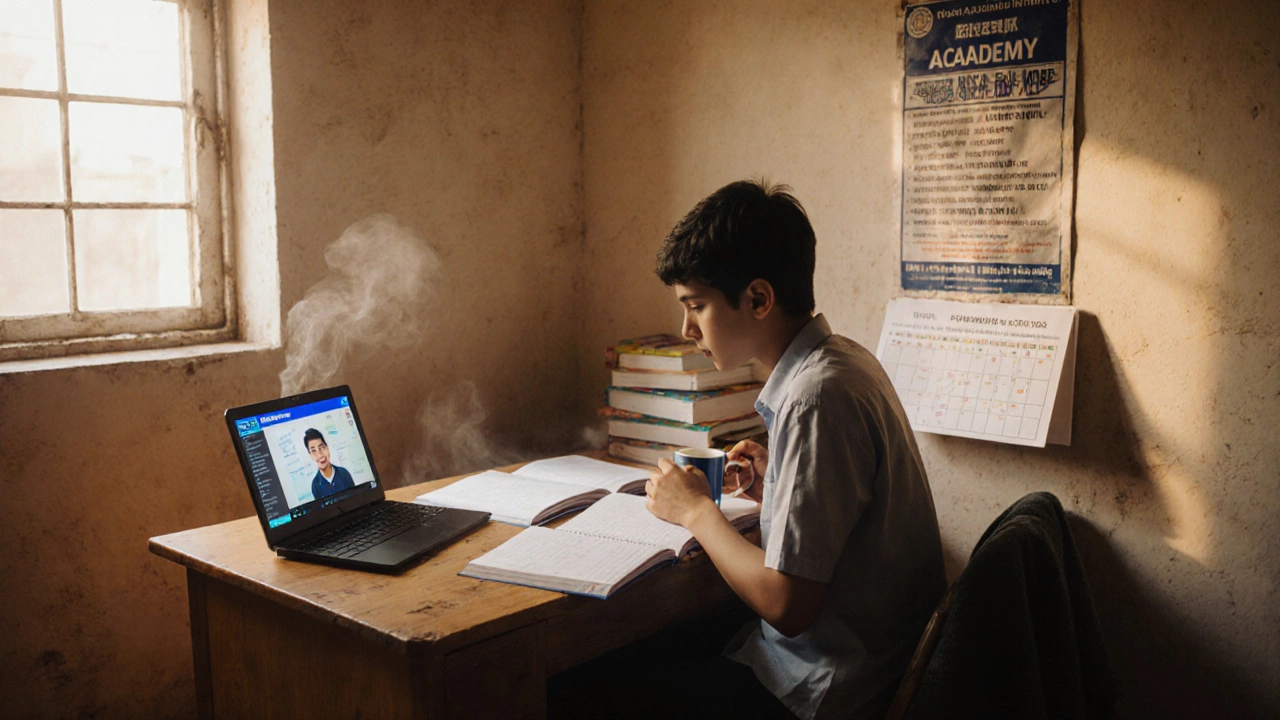
JEE Self-Study Planner
Create Your Plan
Key Benefits
✓ Customized schedule based on your unique situation
✓ Balanced focus on all three subjects
✓ Regular mock test integration
✓ Smart time allocation for weak areas
✓ Built around the proven 12-week framework from the article
When you hear Joint Entrance Examination (JEE) is India's premier engineering entrance test that selects candidates for the Indian Institutes of Technology and other top engineering colleges, the first thought is often about pricey coaching classes. But what if you could crack JEE without coaching? Below is a step‑by‑step roadmap that shows how disciplined self‑study can match, and sometimes beat, the traditional institute route.
Understanding What JEE Actually Tests
JEE tests three core abilities: deep conceptual grasp, analytical problem solving, and time‑pressured execution. The syllabus is drawn primarily from NCERT textbooks (the official school curriculum for Physics, Chemistry, and Mathematics, considered the backbone for JEE preparation). Knowing this helps you focus on the right resources instead of chasing every trendy video.
Why Coaching Feels Compelling - And What It Misses
Coaching institutes promise structured timetables, expert doubt‑clearing, and a competitive peer environment. Those are real benefits, but they also come with high fees, rigid schedules, and a one‑size‑fits‑all teaching style. If you can replicate the guidance, stay disciplined, and pick high‑quality materials, you eliminate the cost barrier while keeping flexibility.
Building a Self‑Study Engine
Self‑study isn’t a scramble of random PDFs. Think of it as building a small engine, where each component fuels the next.
- Choose the right syllabus foundation: Start with the NCERT textbooks (the only source whose concepts are 100% aligned with JEE questions). Finish every chapter, then move to reference books for deeper practice.
- Curate supplemental material: Platforms like Khan Academy (a free video library covering core concepts with practice exercises), Unacademy (offers affordable subscription courses tailored for JEE aspirants), and free YouTube channels (e.g., "Physics Wallah") fill gaps without breaking the bank.
- Design a realistic schedule: Draft a weekly plan that allocates 2‑3 hours per subject on weekdays and 6‑8 hours on weekends. Use a study schedule (a calendar that breaks down topics, practice sessions, and revision blocks) to avoid burnout.
- Integrate previous years' papers: The previous year papers (official JEE questions from the last 10 years, providing a realistic sense of difficulty and pattern) are non‑negotiable. Solve them under timed conditions at least once a month.

Key Habits to Keep You on Track
Even the best plan collapses without daily habits that reinforce learning.
- Conceptual depth before speed: Spend the first two weeks of each new topic on understanding the theory. Ask yourself, "Can I explain this concept to a friend in five minutes?" If not, revisit the source.
- Active problem solving: After a concept is clear, solve 10‑15 varied problems. Use the mock tests (full‑length timed JEE simulations that gauge your readiness) to measure progress.
- Time management drills: Practice the classic 3‑hour JEE paper within a 2‑hour window. This builds the ability to decide which questions to attempt first.
- Self‑discipline: Treat your study hours like a job. Set a dedicated workspace, turn off phone notifications, and take 5‑minute breaks after every 45 minutes of focus.
- Peer learning when needed: Join online forums (e.g., JEE discussion groups on Reddit or Discord). Discussing doubts with peers mimics the classroom interaction without the price tag.
Coaching vs. Self‑Study: A Quick Comparison
| Aspect | Coaching Institute | Self‑Study |
|---|---|---|
| Cost | ₹1‑2 lakh per year | ₹5‑15 k (books + online resources) |
| Flexibility | Fixed class timings | Study anytime, anywhere |
| Guidance | Live teachers, doubt‑clearing | Online video mentors, forums |
| Peer pressure | High - can boost or stress | Low - you set your own pace |
| Customization | Standard syllabus | Tailored to strengths/weaknesses |
Both paths can lead to a JEE rank, but the self‑study column shows you the freedom to allocate resources exactly where you need them.
Real‑Life Success Stories
Consider Rohit Sharma (a 2022 JEE rank‑150 achiever who prepared exclusively from home using NCERT, free YouTube videos, and weekly mock tests). He saved over ₹1.5 lakh and still cleared the exam with a top 200 rank. Another example is Ananya Verma (rank‑350 in JEE 2023, who combined a disciplined study schedule with peer discussions on Reddit). Their common thread? A clear plan, consistent practice, and the willingness to seek help online when stuck.

Common Pitfalls & How to Dodge Them
- Skipping fundamentals: Jumping straight into hard problems erodes confidence. Always finish the NCERT chapter before tackling advanced problems.
- Over‑reliance on one source: Using only one video channel limits perspective. Mix textbooks, videos, and solved examples.
- Neglecting revision: Learning without revisiting leads to rapid forgetting. Allocate 10‑15% of weekly time for previous topics.
- Ignoring mock test analysis: Simply taking a mock test isn’t enough. Review every mistake, categorize it (conceptual, calculation, time‑management) and re‑practice similar questions.
Putting It All Together - Your 12‑Week Action Plan
- Weeks 1‑2: Finish all NCERT chapters for Physics, Chemistry, and Mathematics. Summarize key formulas in a personal notebook.
- Weeks 3‑4: Begin reference books (e.g., H.C. Verma for Physics, O.P. Tandon for Chemistry). Solve 20 problems per chapter.
- Weeks 5‑6: Watch targeted video lessons for weak topics. Start solving previous year questions for the topics you’ve covered.
- Weeks 7‑8: Take your first full‑length mock test. Analyze results and create a “weak‑area” list.
- Weeks 9‑10: Focus intensively on weak areas using additional problems and short video explanations.
- Weeks 11‑12: Two more mock tests under exam conditions. Fine‑tune time allocation and revise formulas daily.
Follow this roadmap, stay honest with yourself, and you’ll have built a solid chance to crack JEE without coaching. The journey demands effort, but the payoff-financial freedom and tailored learning-makes it worthwhile.
Frequently Asked Questions
Is it realistic to aim for an All‑India rank below 500 on a self‑study plan?
Yes, many students have achieved sub‑500 ranks purely through self‑study. Success hinges on disciplined scheduling, thorough NCERT coverage, and regular mock test analysis.
What are the most cost‑effective online resources?
Free platforms like Khan Academy, YouTube channels (Physics Wallah, Vedantu), and the official JEE Main website for past papers provide high‑quality material without any fee. Paid subscriptions such as Unacademy or Toppr offer structured courses at ₹5‑10 k per year, still far cheaper than coaching.
How much time should I allocate daily for each subject?
A balanced routine could be 1.5 hours for Physics, 1 hour for Chemistry, and 1.5 hours for Mathematics on weekdays. On weekends, extend each to 3‑4 hours, adding a short mock test every Sunday.
Should I join any offline study groups?
If a local group meets regularly, it can provide motivation and quick doubt‑clearing. However, keep the group focused; avoid turning it into a social hangout that distracts from study time.
What’s the best way to track my progress?
Maintain a simple spreadsheet: list topics, mark completion date, record mock test scores, and note recurring mistake types. Review this sheet weekly to adjust your study plan.







